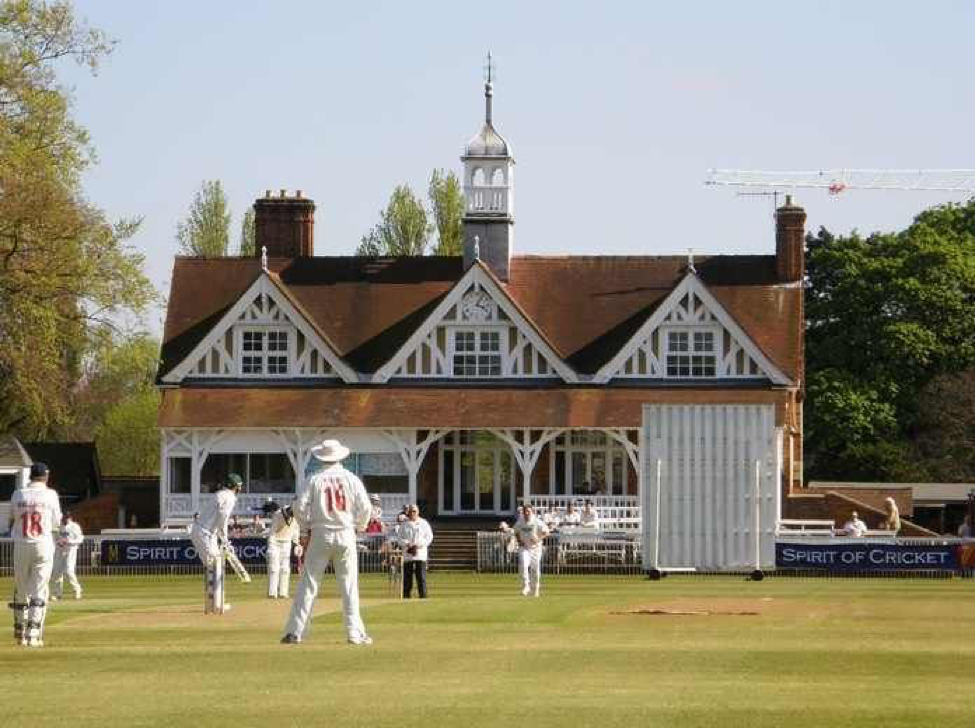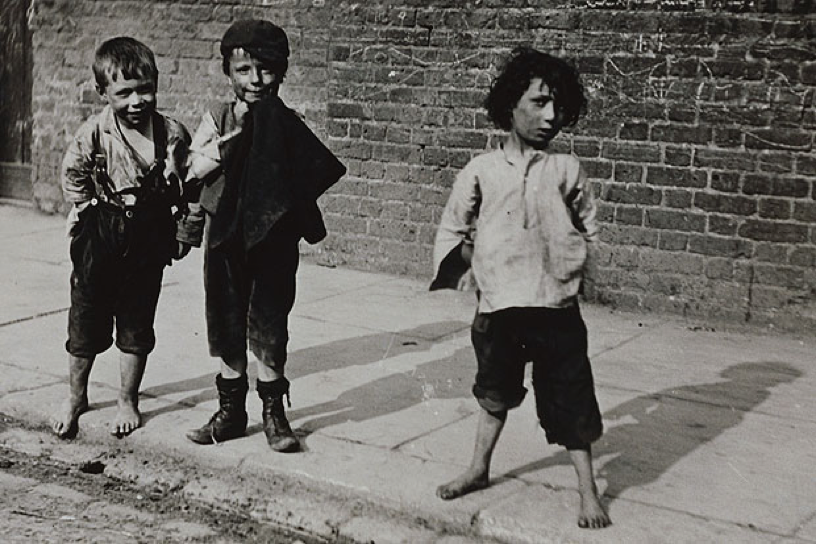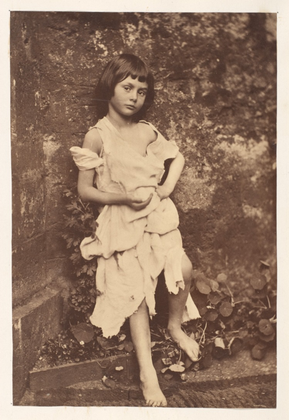|
In the early hours of the morning of May 22, 1867 Charles Dodgson worked feverishly on a one-hundred line poem that opposed the Vice-Chancellor of Oxford’s Decree of April 29 calling for the conversion of a park in North Oxford into a cricket pitch. The poem he wrote is a parody of Oliver Goldsmith’s “The Deserted Village” (1770). It should not surprise us that Dodgson framed his protest in this parodic form, but why did he care, what did he have against the sport of cricket, and what can we learn from this controversy about his conception of childhood? First of all, he laments the artificial levelling of the naturally rolling grounds of the park. Adown thy glades, all sacrificed to cricket, Thy hollow-sounding bat now guards the wicket; Sunk are thy mounds in shapeless level all, Lest aught impede the swiftly rolling ball; And trembling, shrinking from the fatal blow, Far, far away thy hapless children go. The destruction of this natural space has displaced its natural inhabitants, children. In the romantic tradition, Dodgson identifies children here as a part of nature and as vulnerable to Victorian “progress.” But the children he describes are not privileged drawing room children like Alice Liddell, daughter of the Dean of Christ Church College, but “urchins.” He deplores the loss of the “charms” belonging to, The never-failing brawl, the busy mill Where tiny urchins vied in fistic skill-- (Two phrases only have that dusky race Caught from the learned influence of the place; Phrases in their simplicity sublime, “Scramble a copper!” “Please, Sir, what’s the time?”) These round thy walks their cheerful influence shed; These were they charms—but all these charms are fled. A man of his age and an essentialist, Dodgson conflates race and class when he refers to the unwashed, coal smudged children as “that dusky race.” But more importantly he idealizes the freedom of the brawling, fighting “urchins” whom he considers much closer to nature than the drawing room child. This idealization helps to explain why he photographed Alice barefoot dressed as a beggar. Supervised by her governess, Miss Prickett, and shuffled between lessons and fittings by her ambitious mother, Alice could only pretend to be a child of nature.
Of course it is deeply problematic to idealize and prettify childhood poverty, but Dodgson was on to something in opposing the overly structured lives of middle and upper class Victorian children. In a letter to May Forshall, one of his child friends, he wrote: “Do you ever play at games? Or is your idea of life “breakfast, lessons, dinner, lessons, tea, lessons, bed, lessons, breakfast, lessons,” and so on? It is a very neat plan of life and almost as interesting as being a sewing machine or a coffee grinder.” Just the word coffee grinder evokes images of Dickens’ Mr. Gradgrind stuffing facts down little childrens’ throats and destroying their imaginations. When he asks Miss Forshall if she plays at “games,” Dodgson does not mean exclusive, organized sports like cricket, which he associates with wealth and privilege. Ill fares the place, to luxury a prey, Where wealth accumulates, and minds decay; Athletic sports may flourish or may fade, Fashion may make them, even as it has made; But the broad Parks, the city’s joy and pride, When once destroyed can never be supplied! Rather he means the kind of imaginative games that children invent on their own, games without “pavilions” and “scorers’ tents,” games without winners and losers, games without complicated and absurd rules. Dodgson was obsessed with childhood and children because they represented for him freedom from the oppressive constraints of Victorian life. They represented freedom from finicky indoor spaces, freedom from ticking wristwatches, freedom from attention to manners and dress, and finally freedom from the burdens of his academic work.
90 Comments
12/5/2016 06:35:06 pm
Rather he means the kind of imaginative games that children invent on their own, games without “pavilions” and “scorers’ tents,” games without winners and losers, games without complicated and absurd rules. http://cricfrog.com/
Reply
11/7/2019 11:29:31 pm
Softball is a team game which includes a number of players that will take turn to bat and make runs to obtain a score. Specifically, this sport requires at least nine (9) players who will function as a pitcher, a catcher, three players as basemen, a shortstop and three outfielders
Reply
2/24/2017 12:42:00 am
So many articles I have find about Charles Dodgson and the following ways are prepared against the cricket pitch. So we are interested to get more knowledge on these topics ant thank you very much.
Reply
9/18/2017 10:05:45 am
great post i really like your work keep posting :)
Reply
vadim
9/24/2017 06:10:09 pm
ad1game . profit . verifycode: e99184590b0e6fbe9aefd47ed3c2d55d
Reply
6/16/2018 05:43:28 pm
All FIFA matches details on: https://watchfifawc.com/fifa-world-cup-broadcasting-rights/
Reply
6/16/2018 05:44:48 pm
Watch FIFA World Cup 2018 live Online On all TV Channels world wide. For More info visit:
Reply
9/15/2018 11:10:52 pm
Cricket match prediction for dream 11 matches . Do see here: www.fansreviews.in
Reply
1/7/2019 12:55:41 am
New users will come for the following your post. Thanks
Reply
3/8/2019 05:50:49 am
Spot on with this write-up, I truly think this website needs much more consideration. I’ll probably be again to read much more, thanks for that info.
Reply
5/13/2019 11:11:55 pm
Nice info!
Reply
8/5/2019 05:39:08 am
thanks for sharing.
Reply
5/15/2020 05:32:56 am
Thanks for sharing such a great and informative post. It's stimulating game allow you to stop sims and objects from become stuck or trapped, so there's a practical use too them
Reply
8/24/2020 07:22:18 pm
Some clients talk to them face to face, as they like to see their bright, alluring faces while talking. Some of them like to call over phone. They are educated, so they know how to talk about something, which is in a delicate position.
Reply
1/31/2022 02:19:39 am
As several companies have opened their offices here in this city of Chennai, there is a steady flow of workers starting from the newly graduated fresher buddies to workers of the labor class.
Reply
2/21/2022 04:48:17 am
protein loss and hair for some people coconut canvas structure in ways that other not suitable to which is why some people are amazing snappily when using coconut canvas for hair treatment have been used for Thousand Years the rate of salutary canvases and I had honey and magnesium and reason not used as an everyday product one also I can help you reduce flaking and itching in crown this is substantially because coconut canvas has amazing moisturizing parcels pura cogirlsol the canvas stashing from which is presumably the main cause for dandruff how to use Delhi Attendants Service
Reply
6/27/2022 10:40:26 am
Nice article! Thanks for sharing this informative post. Keep posting!
Reply
8/10/2022 09:45:08 am
Reply
8/12/2022 01:37:41 am
Thank you for this excellent article. Appreciate it!
Reply
8/17/2022 02:56:38 am
Thank you for your thoughts on this. It will benefit me and, no doubt, some of the readers in the future. More power to you!
Reply
9/13/2022 06:31:39 pm
We improve our clients’ lives by enhancing their houses, giving them a place to relax, reconnect, and revitalize while feeling proud of their achievements and home. Stones and Cabinets City delights our customers and makes them proud of their houses by making the complex simple.
Reply
9/13/2022 06:33:52 pm
We are keen on improving the quality of life for our drivers and their families by providing the best technology, higher pay, premium benefits, and ensuring efficient operations and load planning that lets them maximize their home life without sacrificing safety or income.
Reply
9/13/2022 06:36:14 pm
Knowledgeable and expert technicians at I-Cell Station identify your cell phone issues for free so that we can offer you the best possible solutions. We have expert-level solutions for all damaged cell phone devices, from screen replacements to charging ports and batteries, cameras speakers, back glass to motherboard level repairs.
Reply
9/13/2022 06:40:46 pm
Blogging refers to writing, photography, and other media that's self-published online. Blogging started as an opportunity for individuals to write diary-style entries, but it has since been incorporated into websites for many businesses.
Reply
9/13/2022 06:43:02 pm
A Toronto based digital marketing agency with a passion for design.Business owners trust us to build & grow their online presence. We’re proud to help businesses in many industries be visible to their consumer.
Reply
https://www.escortserviceinbanglore.com
Reply
https://www.escortagencyhyderabad.com
Reply
10/29/2022 02:27:54 pm
https://www.escortservicesinhyderabad.com/
Reply
10/31/2022 04:02:25 am
https://www.pritimahajan.com/
Reply
10/31/2022 04:58:00 am
https://callgirlsofhyderabad.com
Reply
12/10/2022 06:44:50 am
The best alternative to the rest is Aliya sen for those in an unusual state that is not exposed, confident, hot fiery, hot, and other top offices.
Reply
2/4/2023 06:46:07 am
They like to meet new people daily and get attached with them as our Escorts provide unstoppable facility and service which make you feel delightful and you always feel glad to have such hot sizzling babes as your love charms. If you plan to take them out of the station then go for it as they are totally party freak and like to for the Clubs, events or any trip with you where you can see the babes are providing the best amenities to you which can change your mood and they show you every sexual drive which you expected from your earlier escorts from their service. They are always ready to stand in your good or bad times and in fact if you are frustrated from your life then come as our agency is well known for such people who never did their lovemaking session with any models and now looking for hot Celebrity Escorts in Hyderabad to fulfill their need. You always see our High profile Celebrity Escorts can create perfect environment for you so you never feel shy. Call now or visit here to make your day memorable
Reply
2/6/2023 04:43:56 am
Most likely, your spouse won't be trusting enough to indulge all of your desires. Our escort females won't deter you, though, if you want to go naughty and wild on the bed. They are aware of the best ways to please their customers and guide them to success while enjoying cosy moments with <a href="https://www.delhinight.in/escorts-service-in-chanakyapuri/">escorts service in chanakyapuri</a>.
Reply
3/12/2023 01:42:38 pm
My Self Simmi Pradhan, It’s amazing to go to see this web page and reading the views of all friends about this paragraph, while I am also keen of getting know-how.
Reply
3/12/2023 01:43:19 pm
I am regular visitor to your blog. This piece of writing posted at this site is truly pleasant.
Reply
3/12/2023 01:43:45 pm
Hey Admin! I really love your writing very much! share we keep up a correspondence extra approximately your article
Reply
3/12/2023 01:44:22 pm
Nice work! This is the type of info that should be shared across the net. Disgrace on Google for not positioning this publish higher! Come on over and talk over with my web site . Thanks =)
Reply
3/12/2023 01:44:47 pm
I Love this one & I’ve been following your blog, Keep up the good job!
Reply
7/30/2023 02:20:26 pm
AC Duct Cleaning in Dubai provides skilled AC maintenance services to keep your cooling system in peak condition. We are committed to offering dependable and effective AC repair solutions in your local areas of Dubai.
Reply
6/1/2024 06:45:10 am
FactoringFast offers top-notch Freight Bill Factoring and Invoice Factoring services designed to enhance your cash flow and streamline your business operations.
Reply
6/1/2024 06:45:39 am
FactoringFast offers top-notch Freight Bill Factoring and Invoice Factoring services designed to enhance your cash flow and streamline your business operations.
Reply
6/4/2024 04:34:34 am
Eco Packaging Experts Sydney based packaging company, competitive price for top quality products and great service within Australia. Same day despatch for the stocked products.
Reply
6/4/2024 04:34:50 am
Eco Packaging Experts Sydney based packaging company, competitive price for top quality products and great service within Australia. Same day despatch for the stocked products.
Reply
6/5/2024 03:45:53 am
Prosource Audio offers lighting control solutions based on outdoor lighting automation to enhance outdoor lighting installation.
Reply
6/8/2024 03:20:46 am
Unlock your potential with a professional life coach in St Louis Transform your life and relationships through expert coaching Experience personalized guidance and growth with a trusted life and relationship coach.
Reply
6/8/2024 08:03:29 am
Suntree Endocrinology Hormones play a crucial role in diabetes care because they can influence blood sugar levels.
Reply
6/8/2024 08:03:55 am
Suntree Endocrinology Hormones play a crucial role in diabetes care because they can influence blood sugar levels.
Reply
6/15/2024 08:08:48 am
Searching for Relationship advice Our Frolic For Life will help individuals or couples to find a deeper meaning and connection in their relationship!
Reply
6/15/2024 08:09:09 am
Searching for Relationship advice Our Frolic For Life will help individuals or couples to find a deeper meaning and connection in their relationship!
Reply
6/17/2024 03:32:07 am
Real & Authentic Best Escorts Call Girls In Pune_ Kp
Reply
6/17/2024 03:39:09 am
Lovely Escorts In Pune_ Best Call Girls Escorts
Reply
6/17/2024 03:40:05 am
Royal Class Escorts Call Girls In Hinjewadi
Reply
6/17/2024 03:42:39 am
Trusted Escorts Call Girls In Pune
Reply
6/17/2024 03:45:41 am
We Are Providing Best Escorts Service Independent Call Girls In Wakad
Reply
6/17/2024 03:46:52 am
Fantasy Dream Come True With Lovely Bavdhan Escorts In Hinjewadi Pune
Reply
6/17/2024 03:53:50 am
Independent Escorts Call Girls In Pune - Pcmc
Reply
JOHN
6/21/2024 08:09:12 am
I have read your post, it’s very informative and helpful too for readers. Professional and efficient service from the <a href=”https://lavoltage.com/ “>outdoor lighting</a> team, transforming our yard into a nighttime oasis.
Reply
6/22/2024 03:20:25 am
We provide comprehensive and cooperative service. We guarantee complete satisfaction. If you are unhappy with your experience, we will refund your fees with no questions asked.
Reply
6/24/2024 07:00:24 am
Real Texas Plumbing offers top-notch plumbing services in Leander, TX. Our experienced Leander plumbers are dedicated to providing high-quality, reliable solutions for all your plumbing needs.
Reply
6/24/2024 07:00:57 am
Real Texas Plumbing offers top-notch plumbing services in Leander, TX. Our experienced Leander plumbers are dedicated to providing high-quality, reliable solutions for all your plumbing needs.
Reply
6/26/2024 12:53:46 am
Hi, What an impressive post! Your blog brilliantly illuminates the artistry and functionality of outdoor lighting, inspiring us to create captivating outdoor spaces Outdoor lighting can truly transform a space, creating a magical ambiance that enhances both aesthetics and safety!
Reply
6/27/2024 04:59:27 am
Koregaon Park is known for its lush greenery, high-end restaurants, trendy bars, and luxury apartments. The area is home to the famous Osho Ashram, which attracts a significant number of international visitors. This influx of tourists, along with the area's affluence, creates a demand for various services, including those offered by call girls.
Reply
7/5/2024 01:55:55 am
Taxi DenHaag naar Schiphol nodig Haagse Taxi Online hebben wij vaste lage prijzen! Bestel online, mail of bel 070 204 2334
Reply
7/10/2024 07:56:14 am
Our escorts are selected for their beauty, intelligence, and professionalism.
Reply
7/11/2024 01:12:09 am
SPM Furniture specializes in coffee tables, expanding to offer wardrobes with sliding doors, tables, sofas, and corner sofas with a sleeping function. Our evolution reflects dedication to diverse client needs. From humble beginnings in coffee tables, we've grown into a comprehensive furniture provider, committed to quality and customer satisfaction.
Reply
7/11/2024 01:12:36 am
SPM Furniture specializes in coffee tables, expanding to offer wardrobes with sliding doors, tables, sofas, and corner sofas with a sleeping function. Our evolution reflects dedication to diverse client needs. From humble beginnings in coffee tables, we've grown into a comprehensive furniture provider, committed to quality and customer satisfaction.
Reply
7/11/2024 06:38:03 am
Mcpack Custom packaging can truly elevate a product’s appeal and functionality! Whether you’re looking to enhance brand recognition or ensure your products arrive safely, custom packaging offers a myriad of benefits.
Reply
7/15/2024 03:24:27 pm
I'm constantly impressed by the insightful and practical tips shared on your blog. Keep up the fantastic work ! I'm impressed by the durability and classic look of brass spotlights featured on your blog. They’re a great choice for any landscape!
Reply
7/18/2024 08:49:32 am
Discover Seychelles Car Hire offers top-quality car rental services in Mahe, providing cheap car rental in Seychelles and the best car rental experience in Mahe, Seychelles. Whether you need a car rental on Mahe Island or anywhere in Seychelles, we guarantee excellent service and affordable rates. Choose us for your Seychelles car rental needs and explore the island with ease.
Reply
7/18/2024 08:49:58 am
Discover Seychelles Car Hire offers top-quality car rental services in Mahe, providing cheap car rental in Seychelles and the best car rental experience in Mahe, Seychelles. Whether you need a car rental on Mahe Island or anywhere in Seychelles, we guarantee excellent service and affordable rates. Choose us for your Seychelles car rental needs and explore the island with ease.
Reply
7/24/2024 08:16:03 am
Car rental at Seychelles International Airport SEZ Great deals at great prices, from the biggest car rental companies Call Book online 248 2522876
Reply
7/24/2024 08:42:25 am
Sunshine Cars is a well established award winning car hire company operating in the Seychelles Visit us today to book your vehicle!
Reply
Leave a Reply. |
Caroline McAlisterCaroline is an avid reader, children's writer, and teacher. She lives in North Carolina with her husband and dog. Check out her bio for more! Archives
February 2024
Categories
All
|



 RSS Feed
RSS Feed